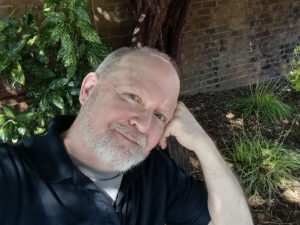“Oh, you’re welcome in church,” he says. “So long as you don’t got no dignity.” I chuckle in recognition. “Yeah, there’s a grovel factor,” I reply. “It doesn’t seem to matter how long it’s been.”
We’re standing in our local parole and probation office. My new acquaintance, or “brother” as cons tend to call each other, is Black, easily 6’4,” with arms the size of thighs, and the balanced air of a man who knows how to handle himself.
“You the ex-con in their eyes,” he says, shaking his shaved head. “You keep your place, you okay. The minute you anything else, they shut you down.”
In 2006 I was convicted of criminal impersonation. I made a mistake, a bad one, and I answered for it. I confessed my crime. My punishment was just. I did my time. I paid what I owed. After my release, I spent a few years providing weekly, then monthly, reports to court officers. The waiting room was usually full so we compared stories to pass the time. Where did you do time? How long have you been out? And so forth.
The subject of church came up more often than you might think. I learned that my story was similar to many others, both with congregations and with my family.
“I’m so mad at you!” my daughter screamed when I told her the truth immediately after my arrest. And later: “I forgive you, Dad.” Jess died in 2015. She was twenty-six. I thank God for her generous spirit. Her forgiveness is a lifeline in moments of despair.
I also believe that the Lord has shown me mercy and compassion. But forgiving myself is something else entirely. I try to keep in mind that I was not born a fraud; rather, I did a fraudulent thing. Redemption is not beyond my grasp. “Our brokennness is truly ours. Nobody else’s,” observes Henri Nouwen. “Our brokenness is as unique as our chosenness and our blessedness.”
Such self-awareness does not come easily. How many of us can forget our past mistakes or terrible behavior? At times it feels like a Herculean task to believe God’s promise in Isaiah: “I, yes I, am the one who blots out your offenses for my own sake; I will not remember your sins.” But on good days, I take God at his word. He will not remember.
We ask something divine, then, when we request the same of others.
Consider the old proverb that a tiger doesn’t change its stripes. Under the inevitable scars of life, a pattern remains. We and others notice the design. But a tiger is more than a few stripes. This is similar to human fingerprints. They do not change. Yet we are all more than our appendages.
Sooner or later each of us may be seen as an object rather than as a person. We may be identified by political party or ideology, perhaps; a skin color; a religious belief. You drink? Ah-hah! Lush! You tried a little pot in high school? Stoner! Words can welcome or rebuff; help or harm. Such labels hinder understanding.
The moment we stop seeing others as people and apply a label, we have failed to acknowledge them as individuals. “The image of God is in the criminal as well as in the saint,” writes theologian and philosopher Abraham Heschel. “The basic dignity of man is not made up of his achievements, virtues, or special talents. It is inherent in his very being.”
It’s not only churches. I’m no better. I rarely see others as created in the image of God. And I don’t mind labeling people, often to my subsequent shame and embarrassment.
While still reporting to the parole and probation office, I enroll in a local college’s sommelier certification course. About a month into the term, one of the students does a quick Internet search on my name (who knows why), and the truth is revealed.
The next week I take my usual desk on the right side of the lecture hall. But rather than sit sprawled across the room as usual, the entire group of students settles in on the left. They’re a little packed across the aisle. I spend that eight-hour class alone among empty seats.
But it doesn’t last. One student that I have casually dismissed in my mind as a blowhard possesses a personality that simply will not be told. The following class, he and his wife cross the aisle to sit on the right side of the room in a row behind me. Now we were three. On breaks he makes a point to talk with me; I notice he is not shy about staring at others as he does so. When our class returns from lunch, I say quietly, “Thanks, man.” His wife laughs as he claps his heavy hand on my shoulder: “De nada.” In the coming weeks a few more students join us and soon the class is again spread over both sides of the aisle.
This is why I’m not surprised that some churches find it difficult to welcome convicted criminals. Did I act any differently when I mentally called a decent man blowhard? Sooner or later fellow parishioners discover my past. Those who had previously greeted me with smiles and handshakes find ways to hint through word and deed that I am no longer one of them. For example, a Bible study leader called my wife at work to tell her they were permanently cancelling the group we attended—only to restart it two weeks later without a word. He still avoids me in the grocery store.
A friend suggests that I facilitate church-sponsored support groups for ex-cons. I know he means well, but his solution perpetuates the problem. Our identities as individuals disappear under a label of criminal when we participate in such marginalizing activities.
My companion in the parole office has a point. When convicted felons ask for the same dignity, self-respect, and mercy offered to all in a house of God, we are often met with cold looks and physical distancing. In my dark moments I unjustly (and a tad bitterly) grumble that we’re only welcome when we crawl.
For example, the day after my father’s funeral I joined my sister for Sabbath services. A man stood to speak. Twelve years earlier he had pleaded guilty to criminal charges. For well over a decade he was not allowed to participate in church activities other than as an observer. But that week they asked him to organize a Sunday school class. He wept openly over his many flaws and expressed gratitude that the church was finally allowing “someone like me” to have a role in their congregation. My sister, an intelligent person who often looks for the positive, assured me that he had successfully “gone through the process of repentance.”
I don’t see it that way. He had answered for his crime. The court was satisfied; his civil liberties restored. But for twelve long years he begged cap-in-hand for scraps from the table of communion and joy. Here I pause. A dozen years and still he feels constrained to grovel.
Acceptance is not easy for anyone, the felon or his new friends. But not every congregation is the same.
Truly welcoming churches, for example, slowly see ex-cons as part of their community. At first parishioners may use euphemisms to adjust to the new influence in their congregation: He’s on a journey, they say uncomfortably; or, He has a history. Soon they realize that these platitudes are often different ways of saying, He is not one of us. Members of these churches also report that over time they come to see the person and forget the crime.
In another example, Philip, a friend of many years before and after my conviction, confessed in 2018, “I had forgotten all about your past. I don’t even think about it.” Philip is a bright man with a keen memory. Yet he sees beyond my earlier actions to the man he knows today. That same year I wrote a volume on grief called Wounded in Spirit. “I know the author of this book,” Philip writes in the foreword, “his own griefs, mistakes for which he has paid dearly, his inconsolable loss. It surprises me not at all that David would write [a] book with such a title.”
It’s not easy, I know, to publicly stand beside a convicted criminal. Friends might reasonably turn away. Yet like Philip, many continue to rally round me. They seem to know, as I now realize, the truth of Dallas Willard’s insight into our long, joyous, and sometimes tortuous lives: “Nothing irredeemable has happened to us or can happen to us on our way to our destiny in God’s full world.”
My redemption began with my daughter’s forgiveness. And a liberating phone conversation.
My aunt Ann calls shortly after my release. She is a devout Catholic who takes the sacrament of penance and reconciliation seriously. “How long has it been since we talked,” she asks, delighted. “Five years?” I tell her it’s been a while. “Well, you confessed and that’s that,” she says. “What are you doing NOW?”
Now I am moving forward. Forgiven.
Image via In Museums







4 comments
Carla Galdo
Thank you for sharing these experiences so sincerely. It is a gift to me, especially in these days when so much of the culture tends towards knee-jerk “cancellation” of people or institutions for whatever flaw they deem “unforgivable.” In the church we would like to think we are immune to such trends, that we’ve learned the ways of forgiveness ourselves, but we are swimming in the waters of today and we must be so intentional and so constant in our efforts to live and love differently. God bless you!
David Bannon
Your comment is a gift to me, as well. “We must be so intentional and so constant.” I like that, though I am seldom up to the task! Thank you, Carla.
Teddy
These are beautiful and healing words. Thank you!
David Bannon
And thank you, Teddy.